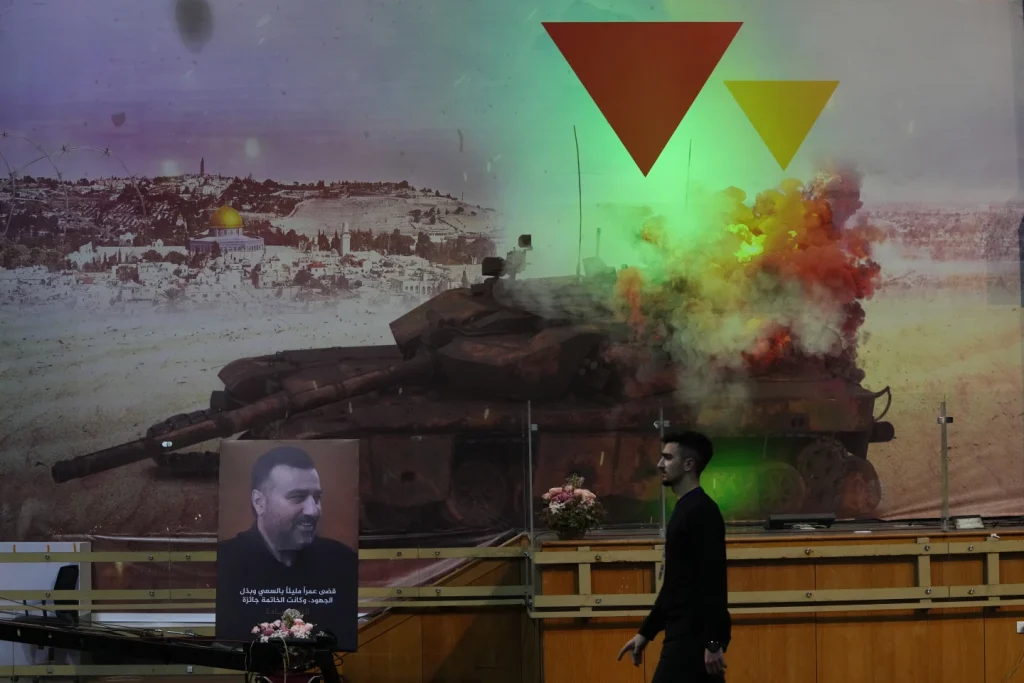The recent escalation of violence in the Middle East, particularly between Israel and Hezbollah, has raised concerns about the potential for a wider regional conflict.
The attack on an air traffic control base in northern Israel by Hezbollah, coupled with ongoing clashes with Hamas militants in Gaza, has heightened tensions in the region.
The Israeli military has reported that the air traffic control base on Mount Meron was targeted by Hezbollah, but fortunately, no soldiers were injured and the damage will be repaired.
This attack comes amidst a period of intense fighting, which has led to the evacuation of tens of thousands of Israelis living near the Lebanese border.
The situation is further complicated by the targeted killing of a top Hamas leader in a Hezbollah stronghold in Beirut, which is believed to have been carried out by Israel.
The United States, through Secretary of State Antony Blinken, has expressed concern about the potential for the conflict to escalate further.
Blinken emphasized the need for diplomatic efforts to prevent the situation from deteriorating into a full-blown regional conflict.
The U.S. has been working with key mediators, such as Qatar, to try to defuse the tensions and prevent further suffering and insecurity in the region.
The Israeli military has also made it clear that it is increasing pressure on Hezbollah, a key ally of Hamas, and has warned of the possibility of another war if the situation is not resolved.
The focus on Hezbollah’s elite Radwan force is seen as a strategic move to push the group away from the border and reduce the risk of further attacks.
The recent events in the Middle East serve as a stark reminder of the complex and volatile nature of the region.
The longstanding animosity between Israel and its adversaries, coupled with the involvement of external actors such as Iran, has created a precarious situation with the potential for widespread conflict.
It is crucial for all parties involved to exercise restraint and engage in dialogue to prevent the situation from escalating further.
The international community, particularly the United States and other key mediators, must continue to play a proactive role in facilitating diplomatic efforts to de-escalate tensions and work towards a peaceful resolution.
In conclusion, the recent escalation of violence between Israel and Hezbollah, as well as the ongoing conflict with Hamas, has raised serious concerns about the potential for a wider regional conflict.
It is imperative for all parties involved to prioritize dialogue and diplomacy in order to prevent further suffering and insecurity in the region.
The international community must continue to actively engage in efforts to de-escalate tensions and work towards a peaceful resolution to the ongoing crisis.
The ongoing conflict between Israel and its neighboring militant groups, particularly Hezbollah and Hamas, has been a cause of concern for the international community.
Israel has been primarily focused on containing the fighting in its northern region, as Hezbollah’s military capabilities far surpass those of Hamas.
However, Israeli leaders have expressed their waning patience and willingness to resort to the use of force if diplomatic efforts fail to resolve the tensions.
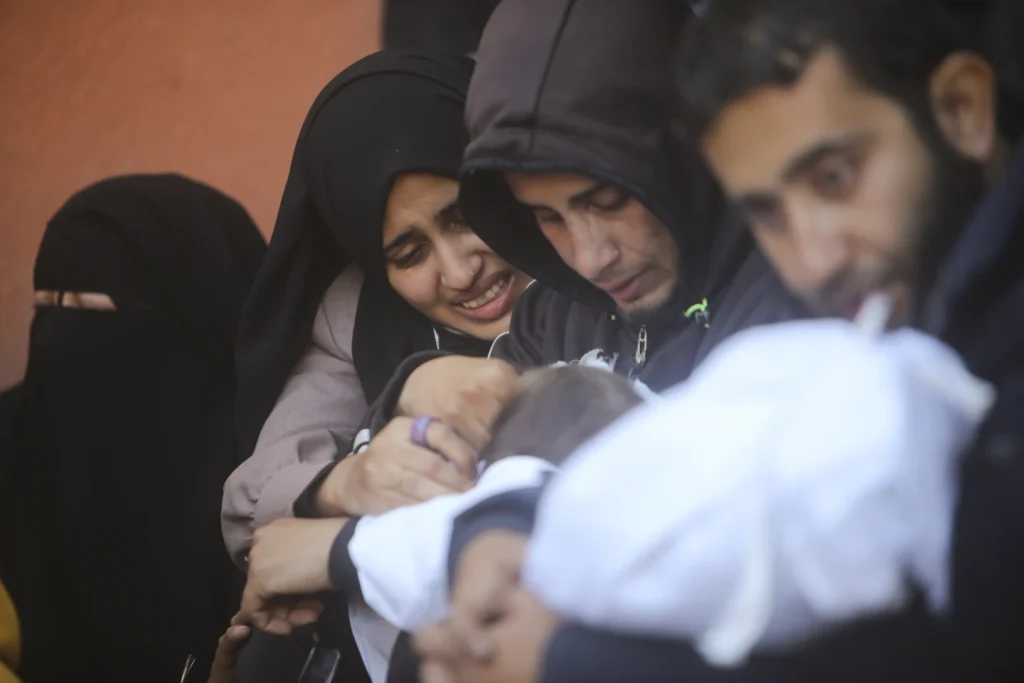
Prime Minister Benjamin Netanyahu has issued a stern warning to Hezbollah, emphasizing that no terrorist group is immune to Israel’s defensive measures.
He has reiterated the government’s unwavering commitment to safeguarding its citizens and ensuring the safe return of the residents in the north to their homes.
The escalation of lower-intensity fighting along Israel’s northern border was triggered by Hezbollah’s rocket attacks following the Hamas assault on southern Israel in October, resulting in a significant loss of civilian lives and the taking of hostages.
Hezbollah has justified its attacks as a means to alleviate pressure on Gaza, where the war against the militant group has entered its fourth month.
The complex negotiations for the potential release of hostages held by Hamas in Gaza have been further complicated by the killing of a senior Hamas leader in Lebanon.
Despite these challenges, Qatar’s government has affirmed its commitment to engaging in discussions with all parties involved and striving to reach an agreement expeditiously.
The situation in the Middle East remains volatile, with the ongoing conflicts posing a threat to regional stability and security.
It is imperative for all parties to exercise restraint and prioritize diplomatic solutions to de-escalate tensions and prevent further loss of life.
The international community must continue to engage in efforts to facilitate dialogue and negotiation, with the ultimate goal of achieving a sustainable peace agreement that addresses the grievances and concerns of all parties involved.
In conclusion, the ongoing conflicts involving Israel, Hezbollah, and Hamas underscore the urgent need for a concerted and coordinated approach to resolve the underlying issues and establish a lasting peace in the region.
The use of force should be a last resort, and diplomatic efforts must be prioritized to prevent further escalation of hostilities.
The international community must remain actively engaged in promoting dialogue and reconciliation to bring about a peaceful resolution to the conflicts in the Middle East.
The ongoing conflict between Israel and Hamas in the Gaza Strip has once again brought to the forefront the devastating toll of war on civilian populations.
The Israeli military has declared the completion of its major combat operations in northern Gaza, claiming to have dismantled Hamas’ military infrastructure in the area.
However, the offensive continues in the southern region, where the majority of Gaza’s 2.3 million Palestinians reside, enduring the dire humanitarian consequences of relentless Israeli airstrikes.
Israeli Prime Minister Benjamin Netanyahu has reiterated that the war will not cease until the objectives of eradicating Hamas, securing the return of Israeli hostages, and ensuring that Gaza no longer poses a threat to Israel are achieved.
Meanwhile, officials from the Biden administration have urged Israel to transition from widespread air and ground assaults to more targeted strikes against Hamas leaders.
The toll on civilian lives has been staggering, with the Health Ministry in Hamas-controlled Gaza reporting that over 22,800 Palestinians have been killed and more than 58,000 wounded since the onset of the conflict.
Tragically, the death toll includes a significant number of women and minors, underscoring the disproportionate impact of the violence on vulnerable populations.
The attribution of blame for civilian casualties has become a contentious issue, with Israel pointing to Hamas’ presence in densely populated residential areas as a contributing factor.
Tragically, this has led to devastating consequences, as evidenced by the recent airstrike near the city of Rafah, which claimed the lives of two journalists, including the eldest son of Al Jazeera’s chief correspondent in Gaza.
The heart-wrenching footage of the grieving father holding his son’s hand underscores the profound human cost of the conflict.
Al Jazeera has vehemently condemned the killings and decried what it characterizes as “brutal attacks against journalists and their families” by Israeli forces.
The loss and suffering experienced by the journalist, who also lost his wife, two children, and a grandchild in a previous airstrike, serves as a poignant reminder of the far-reaching impact of the violence on innocent civilians.
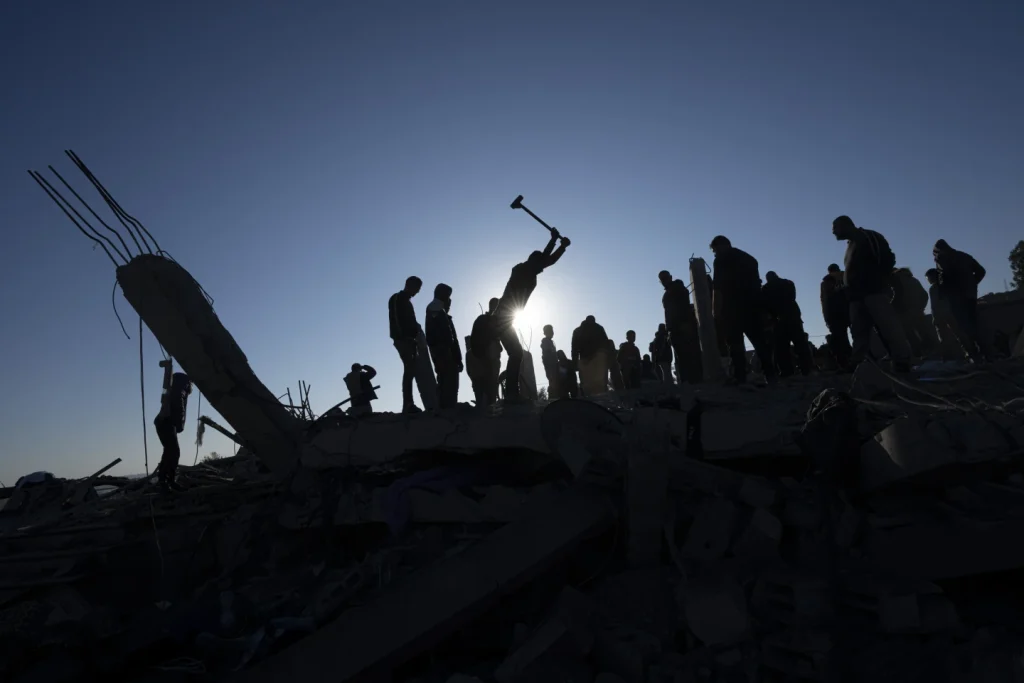
In another tragic incident, an airstrike on a house between Khan Younis and Rafah resulted in the deaths of at least seven individuals, with the harrowing sight of a man carrying a baby to the nearby hospital, only to later walk with the blanket-wrapped child to the morgue, encapsulating the unfathomable anguish experienced by families caught in the crossfire.
The accounts of loss, grief, and devastation emerging from Gaza paint a stark picture of the human suffering wrought by the conflict.
The plea of a grieving relative, expressing disbelief and anguish at the unfolding tragedy, serves as a poignant reminder of the profound human toll of the violence.
The ongoing conflict in Gaza underscores the urgent need for a concerted international effort to address the root causes of the conflict and to alleviate the suffering of civilians caught in the crossfire.
The tragic loss of life and the profound human suffering demand a swift and concerted diplomatic response to bring about a sustainable and just resolution to the conflict.
As the world bears witness to the unfolding tragedy in Gaza, it is imperative that the international community redoubles its efforts to bring about an end to the violence and to pave the way for a lasting peace that upholds the fundamental rights and dignity of all those affected by the conflict.
In conclusion, the ongoing conflict in Gaza has exacted a devastating toll on civilian populations, underscoring the urgent need for a concerted international response to address the root causes of the conflict and to alleviate the suffering of innocent civilians.
The tragic loss of life and the profound human suffering demand a swift and concerted diplomatic effort to bring about a sustainable and just resolution to the conflict.
The recent events in the southern city of Khan Younis and the central city of Deir al-Balah have once again brought to the forefront the devastating impact of conflict on civilian populations in the region.
The loss of innocent lives, including 12 children, in an Israeli strike on a home in the Khan Younis camp is a tragic and stark reminder of the human cost of ongoing hostilities.
Furthermore, the escalation of violence has led to the evacuation of medical staff from critical healthcare facilities, leaving the wounded and vulnerable without essential care.
The situation in Deir al-Balah is particularly alarming, with reports of Israeli forces pushing deeper into the city and residents being warned to evacuate.
The International medical charity Doctors Without Borders, as well as other humanitarian organizations, have been forced to withdraw their staff from Al Aqsa Martyrs’ Hospital due to the dangerous and volatile conditions.
The hospital, which has been inundated with a high influx of wounded individuals, has faced direct threats to its operations, including drone attacks and sniper fire in close proximity to the facility.
The testimonies of medical personnel on the ground paint a harrowing picture of the challenges they have faced in providing care to the injured.
Carolina Lopez, the emergency coordinator for Doctors Without Borders, described the intensity of the situation, highlighting the constant threat to the hospital and the overwhelming number of patients requiring urgent medical attention.
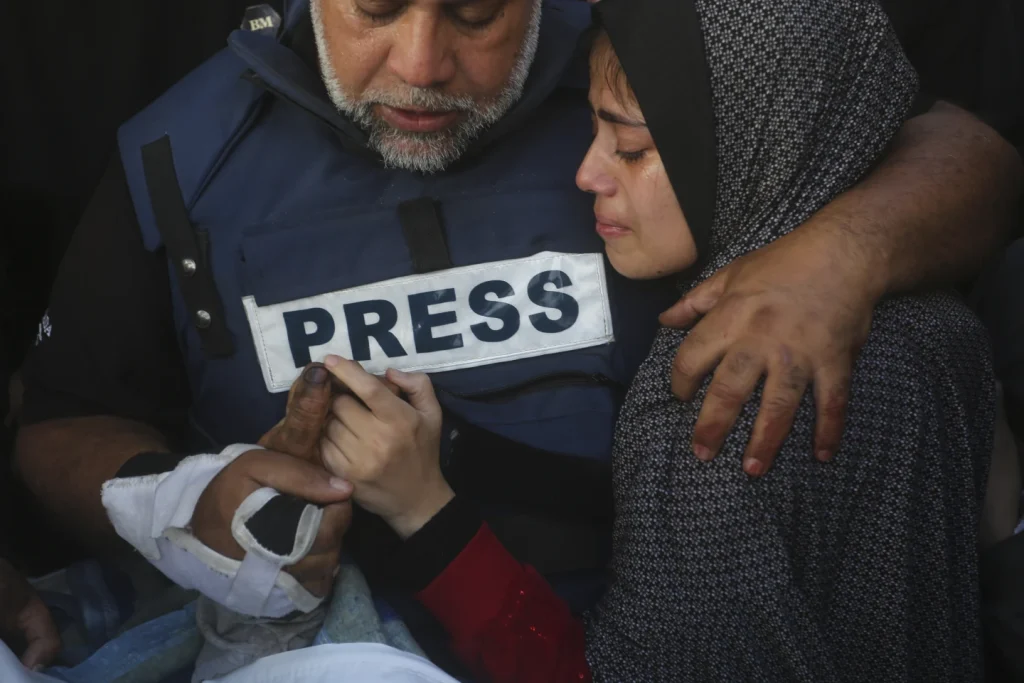
Similarly, surgeon Nick Maynard with the International Rescue Committee emphasized the horrific nature of the injuries being brought in, underscoring the immense strain on the healthcare system in the face of relentless violence.
The impact of these developments extends beyond the immediate loss of life and the strain on healthcare facilities.
The psychological and emotional toll on the affected communities, particularly the families who have lost loved ones, is immeasurable.
The long-term consequences of such traumatic experiences on the mental well-being of individuals, especially children who have been exposed to the horrors of conflict, cannot be overstated.
Moreover, the displacement of residents and the disruption of essential services further compound the humanitarian crisis in the region.
The forced evacuation of neighborhoods and the withdrawal of medical aid organizations from critical healthcare facilities exacerbate the already dire situation, leaving many without access to vital medical care and support.
In light of these distressing events, it is imperative for all parties involved to prioritize the protection of civilians and uphold their obligations under international humanitarian law.
The indiscriminate targeting of civilian areas and essential infrastructure, including hospitals, is unacceptable and must be condemned in the strongest terms.
Ensuring the safety and well-being of all individuals, regardless of their background or circumstance, should be the foremost priority in any conflict situation.
Furthermore, concerted efforts must be made to facilitate the delivery of humanitarian aid and medical assistance to those in need, in accordance with the principles of neutrality, impartiality, and humanity.
The international community, including relevant stakeholders and organizations, has a responsibility to work towards de-escalating tensions, promoting dialogue, and seeking a peaceful resolution to the underlying issues driving the conflict.
Ultimately, the tragic events unfolding in Khan Younis and Deir al-Balah serve as a poignant reminder of the urgent need for a sustainable and inclusive approach to addressing the complex challenges in the region.
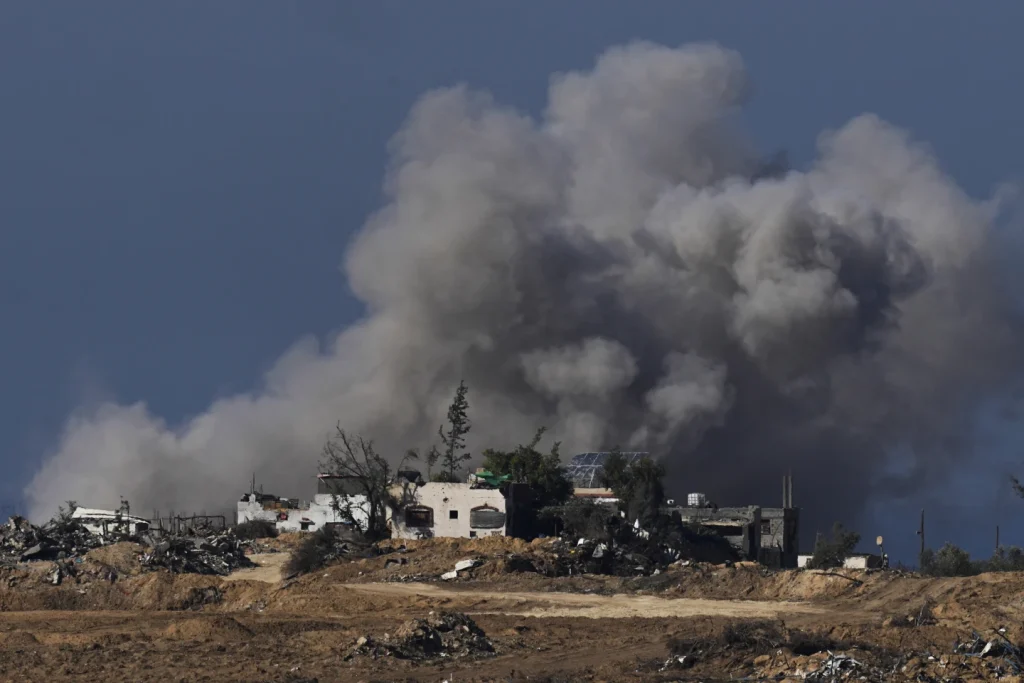
The loss of innocent lives, the displacement of communities, and the strain on essential services demand a collective and unwavering commitment to safeguarding the rights and dignity of all individuals affected by conflict.
Only through genuine efforts to prioritize peace, respect for human rights, and the well-being of civilians can we hope to prevent further suffering and build a more secure and stable future for all.
